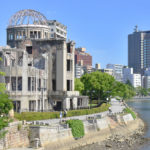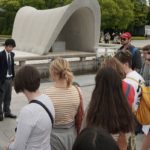Column Genshin Takano’s Letters: Thoughts of the Governor of Hiroshima Around the Time of the Atomic Bombing
Genshin Takano, the Governor of Hiroshima at the time of the atomic bombing sent four letters addressed to Kiyoshi Ikeda, who had held positions such as Governor of Osaka, member of the House of Peers, and member of the House of Representatives. He was also Takano’s superior when Takano was Vice Governor of Osaka. Kiyoshi Ikeda’s personal secretary saved the letters, which are now stored in the Hiroshima Prefectural Archives. Here, these letters that convey Takano’s thoughts as Governor of Hiroshima Prefecture when he faced the atomic bombing will be introduced.
In June of 1945, as a part of the administrative reorganization in preparation for the decisive battles to be fought on the mainland, military district headquarters were set up. The Governor at the time, Isei Otsuka, was appointed Governor-General of the Chugoku District, and Genshin Takano, then Vice Governor of Osaka, became Governor of Hiroshima. The first letter from Takano, dated June 20, 1945, was sent shortly after he became governor. As he was responsible for civilian air defense when there were air raids in Osaka, it was natural for Takano to harbor fears concerning air raids. The letter shows that his greatest concern was establishing measures against potential air raids on Hiroshima.
There have been relatively few air raids in this area until today, but I am convinced that there will be a major air raid coming very shortly. This area is small with many rivers, and almost all buildings are made of wood. I feel anxious at the thought of the unpreventable conditions that would occur should fires break out in this area.
There was no way for Governor Takano to know that air raids over Hiroshima had been prohibited because of the impending dropping of the atomic bomb. However, in a letter dated July 20, he wrote about the fact that Hiroshima had not been the target of air raids and said, “It is rather disquieting.”
Up until now, medium and small cities have all been reduced to ashes; but this city, Hiroshima, remains relatively untouched. It is rather disquieting. I am unsure whether or not we will finish in time, but at present, large-scale building demolition works are underway.
Atomic bombs with immense destructive power were being developed, and the creation of firebreaks by demolishing buildings would end up being meaningless. The bombing caused great losses among the students and members of the Volunteer Citizen Corps who were mobilized to conduct building demolition. The Prefectural Government Office in Kako-machi was completely destroyed; and almost all prefectural government employees, including those already in the office building and those on the way to work were killed. On August 6, Takano was in the Fukuyama area on a business trip and escaped the disaster; however, Governor-General Otsuka and the Mayor of Hiroshima, Senkichi Awaya, both died. As Takano was the only head of local government who had survived, he had no choice but to manage Hiroshima after the atomic bombing. A temporary prefectural government office was set up at Tamon-in Temple located at the foot of Hijiyama Hill, but was moved to the Higashi Police Station on August 7, and again on August 20 to the inside of Toyo Kogyo Co., Ltd. (today’s Mazda Motor Corporation) in Fuchu Town in Aki County.
A letter dated September 7, after the atomic bombing and the end of the war, was sent from the prefectural government office located inside of Toyo Kogyo. In this letter, Takano expresses his sentiment of bitter disappointment at Japan’s defeat and swears that he will follow the emperor’s orders to rebuild Japan.
It is extremely regrettable to me that the Great East Asia War has ended in this way. However, no matter what I say, there is nothing that can be done about it. All I can do is earnestly follow the orders of the Emperor and be resolved to rebuild His country.
On the other hand, as all prefectural government employees, except those who were away on business trips, were affected by the atomic bombing, with 606 already dead, Takano was convinced that a greater number would die. Also, having seen the destructive force of the atomic bomb, he believes, “Scientific research will be the only strategy that decides the outcome of future wars.”
Among the prefectural government employees, 606 have died, and I presume that an even greater number will die. Many of the survivors are those who were away from this area on business trips. It is no exaggeration to say that, including the woundedbe it light or seriousevery employee of the prefectural government has suffered. This makes me think about the form of future wars. Air defense will no longer be effective. Rather, scientific research will be the only war strategy that will decide the winners and losers of future wars.
With the Occupation Forces issuing one order for reform after another, Takano talks about his uneasiness in the letter dated October 4. “Within this year and the next year, our country will face political and economic chaos. I fear I will not be able to endure this terrible anxiety.” Shortly after this, Takano left Hiroshima to become Superintendent-General of the Tokyo Metropolitan Police. He was purged from office in September of the following year. It was almost as if his letters predicted what would become of him when he wrote about, “political and economic chaos.”
Notes and References








